Grant Ulysses Simpson

American Civil War Ulysses S. Grant (born Hiram Ulysses Grant[2]) (April 27, 1822 – July 23, 1885) was general-in-chief of the Union Army from 1864 to 1869 during the American Civil War and the 18th President of the United States from 1869 to 1877. The son of an Appalachian Ohio tanner, Grant entered the United States Military Academy at age 17. In 1846, three years after graduating, Grant served as a lieutenant in the Mexican–American War under Winfield Scott and future president Zachary Taylor. After the Mexican-American War concluded in 1848, Grant remained in the Army, but abruptly resigned in 1854. After struggling through the succeeding years as a real estate agent, a laborer, and a county engineer, Grant decided to join the Northern effort in the Civil War. Appointed brigadier general of volunteers in 1861 by President Abraham Lincoln, Grant claimed the first major Union victories of the war in 1862, capturing Forts Henry and Donelson in Tennessee. He was surprised by a Confederate attack at the Battle of Shiloh; although he emerged victorious, the severe casualties prompted a public outcry. Subsequently, however, Grant's 1863 victory at Vicksburg, following a long campaign with many initial setbacks, and his rescue of the besieged Union army at Chattanooga, established his reputation as Lincoln's most aggressive and successful general. Named lieutenant general and general-in-chief of the Army in 1864, Grant implemented a coordinated strategy of simultaneous attacks aimed at destroying the South's armies and its economy's ability to sustain its forces. In 1865, after mounting a successful war of attrition against his Confederate opponents, he accepted the surrender of Confederate General Robert E. Lee at Appomattox Court House. Popular due to the Union victory in the war, Grant was elected President of the United States as a Republican in 1868 and re-elected in 1872, the first President to serve two full terms since Andrew Jackson 40 years before. As President, Grant led Reconstruction by signing and enforcing Congressional civil rights legislation. Grant built a powerful, patronage-based Republican Party in the South, straining relations between the North and former Confederates. His administration was marred by scandal, sometimes the product of nepotism; the neologism Grantism was coined to describe political corruption. Grant left office in 1877 and embarked upon a two-year world tour. Unsuccessful in winning the nomination for a third term in 1880, left destitute by bad investments, and near the brink of death, Grant wrote his Memoirs, which were enormously successful among veterans, the public, and critics. However, in 1884, Grant learned that he was suffering from terminal throat cancer and, two days after completing his writing, he died at the age of 63. Presidential historians typically rank Grant in the lowest quartile of U.S. presidents for his tolerance of corruption, but in recent years his reputation has improved among some scholars impressed by his support for civil rights for African Americans.[3] Grant was born in Point Pleasant, Ohio, to Jesse Root Grant (1794–1873), a tanner, and Hannah Simpson Grant (1798–1883), both Pennsylvania natives.[4] At birth, Grant was named Hiram Ulysses.[5] In the fall of 1823, the family moved to the village of Georgetown in Brown County, Ohio.[2] At the age of 17, Grant entered the United States Military Academy (USMA) at West Point, New York, after securing a nomination through his U.S. Congressman, Thomas L. Hamer, who erroneously nominated him as "Ulysses S. Grant of Ohio."[6] Grant adopted the form of his new name with middle initial only.[7] Because "U.S." also stands for "Uncle Sam," Grant's nickname became "Sam" among his army colleagues. He graduated from USMA in 1843, ranking 21st in a class of 39. At the academy, he established a reputation as a fearless and expert horseman. Although this made him seem a natural for cavalry, he was assigned to duty as a regimental quartermaster, managing supplies and equipment. Lieutenant Grant served in the Mexican–American War (1846–1848) under Generals Zachary Taylor and Winfield Scott, where, despite his assignment as a quartermaster, he got close enough to the front lines to see action, participating in the battles of Resaca de la Palma, Palo Alto, Monterrey (where he volunteered to carry a dispatch on horseback through a sniper-lined street), and Veracruz. During one battle, Grant saw Fred Dent, his friend, later to become his brother-in-law, lying in the middle of the battlefield; he had been shot in the leg. Grant ran furiously into the open to rescue Dent; as they were making their way to safety, a Mexican soldier was sneaking up behind Grant, but the Mexican was shot by a fellow U.S. soldier. Grant was twice brevetted for bravery: at Molino del Rey and Chapultepec. He was a remarkably close observer of the war, learning to judge the actions of colonels and generals. In the 1880s, he wrote that the war was unjust, accepting the theory that it was designed to gain land open to slavery. He wrote in his memoirs about the war against Mexico: "I was bitterly opposed to the measure, and to this day, regard the war, which resulted, as one of the most unjust ever waged by a stronger against a weaker nation."[8] The Mexican-American War concluded on February 2, 1848. On August 22, 1848, Grant married Julia Boggs Dent (1826–1902), the daughter of a slave owner.[9] Together, they had four children: Frederick Dent Grant, Ulysses S. "Buck" Grant, Jr. , Ellen Wrenshall "Nellie" Grant, and Jesse Root Grant. Grant remained in the army and was moved to several different posts. He was sent to Fort Vancouver in the Washington Territory in 1853, where he served as quartermaster of the 4th Infantry Regiment. His wife, eight months pregnant with their second child, could not accompany him because his salary could not support a family on the frontier. In 1854, Grant was promoted to captain, one of only 50 still on active duty, and assigned to command Company F, 4th Infantry, at Fort Humboldt, California. Grant abruptly resigned from the Army with little notice on July 31, 1854, offering no explanation for his decision. Rumors persisted in the Army for years that his commanding officer, Bvt. Lt. Col. Robert C. Buchanan, found him intoxicated on duty as a pay officer and offered him the choice between resignation or court-martial.[10] However, the War Department stated, "Nothing stands against his good name." At age 32, Grant struggled through seven lean years. From 1854 to 1858, he labored on a family farm near St. Louis, Missouri, using slaves owned by his father-in-law, but it did not prosper. Grant acquired one of those slaves in 1858 (and manumitted him the next year, when the Grants returned to Illinois) and his wife owned four slaves.[11] From 1858–1859, he was a bill collector in St. Louis. Failing at everything, he asked his father for a job, and in 1860 was made an assistant in the leather shop owned by his father in Galena, Illinois. Grant & Perkins sold harnesses, saddles, and other leather goods and purchased hides from farmers in the prosperous Galena area.[12] Although Grant was not affiliated with any political party, his father-in-law was a prominent Democrat in St. Louis, a fact that lost Grant the job of county engineer in 1859. In 1856, he voted for Democrat James Buchanan for president to avert secession and because "I knew Frémont" (the Republican candidate). In 1860, he favored Democrat Stephen A. Douglas but did not vote. In 1864, he allowed his political sponsor, Congressman Elihu B. Washburne, to use his private letters as campaign literature for Abraham Lincoln[13] and the Union Party, which combined both Republicans and War Democrats. Grant announced his affiliation as a Republican in 1868, after years of apoliticism.[14] Shortly after Confederate forces fired upon Fort Sumter, President Abraham Lincoln put out a call for 75,000 militia volunteers. Grant helped recruit a company of volunteers and accompanied it to Springfield, the capital of Illinois. Grant accepted a position offered by Illinois Governor Richard Yates to recruit and train volunteers, which he accomplished with efficiency. Grant pressed for a field command; Yates appointed him a colonel in the Illinois militia and gave him command of the undisciplined and rebellious 21st Illinois Infantry in June 1861. Grant was deployed to Missouri to protect the Hannibal and St. Joseph Railroad. Under pro-Confederate Governor Claiborne Jackson, Missouri had declared it was an armed neutral in the conflict and would attack troops from either side entering the state. By the August 1 the Union army had forcibly removed Jackson and Missouri was controlled by Union forces, who had to deal with numerous southern sympathizers. In August, Grant was appointed brigadier general of the militia volunteers by Lincoln, who had been lobbied by Congressman Elihu Washburne. At the end of August, Grant was selected by Western Theater commander Major General John C. Frémont to command the critical District of Southeast Missouri. Grant's first important strategic act of the war was to take the initiative to seize the Ohio River town of Paducah, Kentucky, immediately after the Confederates violated the state's neutrality by occupying Columbus, Kentucky. He fought his first battle, an indecisive action against Confederate Brig. Gen. Gideon J. Pillow, at Belmont, Missouri, in November 1861. Three months later, aided by Andrew H. Foote's Navy gunboats, he captured two major Confederate fortresses, Fort Henry on the Tennessee River and Fort Donelson on the Cumberland River. At Donelson, his army was hit by a surprise Confederate attack (again by Pillow) while he was temporarily absent. Displaying the cool determination that would characterize his leadership in future battles, he organized counterattacks that carried the day. Both General Floyd and Pillow, the two senior Confederate commanders fled. The Confederate commander, Brig. Gen. Simon B. Buckner, an old friend of Grant's and a West Point classmate, and senior commander with Floyd and Pillow fleeing, yielded to Grant's hard conditions of "no terms except unconditional and immediate surrender." Buckner's surrender of over 12,000 men made Grant a national figure almost overnight, and he was nicknamed "Unconditional Surrender" Grant. The captures of the two forts with over 12,000 prisoners were the first major Union victories of the war, gaining him national recognition. Desperate for generals who could fight and win, Lincoln promoted him to major general of volunteers. Although Grant's new-found fame did not seem to affect his temperament, it did have an impact on his personal life. At one point during the Civil War, a picture of Grant with a cigar in his mouth was published. He was then inundated with cigars from well wishers. Before that he had smoked only sporadically, but he could not give them all away, so he took up smoking them, a habit which may have contributed to the development of throat cancer later in his life; one story after the war claimed that he smoked over 10,000 in five years.
do you like this author?
What readers are saying
What do you think? Write your own comment on this book!
write a commentWhat readers are saying
What do you think? Write your own comment on this author!
write a commentBook list

State of the Union Address
Series:
Unknown
Year:
Unknown
Raiting:
3/5
This book was converted from its physical edition to the digital format by a community of volunteers. You may find it for free on the web. Purchase of the Kindle edition includes wireless delivery. --This text refers to the Kindle Edition edition.
Show more
add to favoritesadd In favorites
Book list

State of the Union Address
Series:
Unknown
Year:
Unknown
Raiting:
3/5
This book was converted from its physical edition to the digital format by a community of volunteers. You may find it for free on the web. Purchase of the Kindle edition includes wireless delivery. --This text refers to the Kindle Edition edition.
Show more
add to favoritesadd In favorites
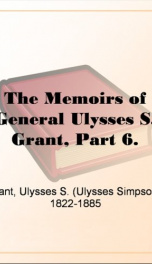
The Memoirs of General Ulysses S. Grant, Part 6.
Series:
Unknown
Year:
Unknown
Raiting:
1.5/5
This book is the sixth part of a collection of memories written by General Ulysses who took part in the American Civil War. He was truly a courageous and brave general, who always solved even the most difficult tasks and was not afraid of making fun of himself. The book includes amazing descriptions of the most outstanding battles of the war. The story is well structured and is written with a wonderful language which makes the book even easier to read and to understand. General Ulysses wrote his memoirs after he retired and when he was dying of cancer. The book is an absolute must have for all readers who are interested in the American Civil War and who want to learn more about it from the memoirs of the immediate participant of those events.
Show more
add to favoritesadd In favorites
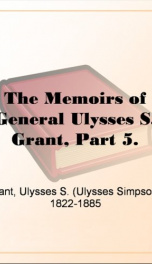
The Memoirs of General Ulysses S. Grant, Part 5.
Series:
Unknown
Year:
Unknown
Raiting:
1.5/5
This book is the fifth part of a collection of memories written by General Ulysses who took part in the American Civil War. He was truly a courageous and brave general, who always solved even the most difficult tasks and was not afraid of making fun of himself. The book includes amazing descriptions of the most outstanding battles of the war. The story is well structured and is written with a wonderful language which makes the book even easier to read and to understand. General Ulysses wrote his memoirs after he retired and when he was dying of cancer. The book is an absolute must have for all readers who are interested in the American Civil War and who want to learn more about it from the memoirs of the immediate participant of those events.
Show more
add to favoritesadd In favorites
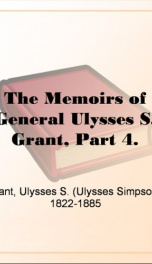
The Memoirs of General Ulysses S. Grant, Part 4.
Series:
Unknown
Year:
Unknown
Raiting:
1.5/5
This book is the fourth part of a collection of memories written by General Ulysses who took part in the American Civil War. He was truly a courageous and brave general, who always solved even the most difficult tasks and was not afraid of making fun of himself. The book includes amazing descriptions of the most outstanding battles of the war. The story is well structured and is written with a wonderful language which makes the book even easier to read and to understand. General Ulysses wrote his memoirs after he retired and when he was dying of cancer. The book is an absolute must have for all readers who are interested in the American Civil War and who want to learn more about it from the memoirs of the immediate participant of those events.
Show more
add to favoritesadd In favorites
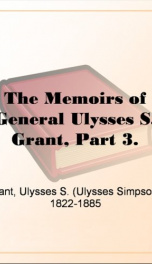
The Memoirs of General Ulysses S. Grant, Part 3.
Series:
Unknown
Year:
Unknown
Raiting:
1.5/5
The third volume of General Grant’s recollections covers removing his headquarters to Memphis, battle of Iuka, Corinth, the campaign against Vicksburg, occupation of Holly Springs, operations at Yazoo Pass, loss of the Indianola, capture of the port Gibson and battle of Raymond and Champion’s Hill, of Black River Bridge, siege and surrender of Vicksburg, and retrospect of the campaign.
Show more
add to favoritesadd In favorites
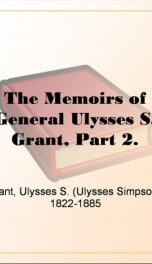
The Memoirs of General Ulysses S. Grant, Part 2.
Series:
Unknown
Year:
Unknown
Raiting:
1/5
This book was converted from its physical edition to the digital format by a community of volunteers. You may find it for free on the web. Purchase of the Kindle edition includes wireless delivery.
Show more
add to favoritesadd In favorites
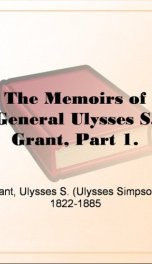
The Memoirs of General Ulysses S. Grant, Part 1.
Series:
Unknown
Year:
Unknown
Raiting:
1.5/5
This volume covers ancestry, birth, boyhood of Ulysses Simpson Grant, his early years and graduation, army life, Corpus Christi, trip to Austin, the Mexican war, advance of Monterey and some other facts of Grant’s life and career. The author writes: The first volume, as well as a portion of the second, was written before I had reason to suppose I was in a critical condition of health. Later I was reduced almost to the point of death, and it became impossible for me to attend to anything for weeks. I have, however, somewhat regained my strength, and am able, often, to devote as many hours a day as a person should devote to such work.
Show more
add to favoritesadd In favorites
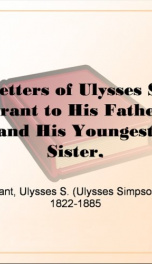
Letters of Ulysses S. Grant to His Father and His Youngest Sister,
Series:
Unknown
Year:
Unknown
Raiting:
0.5/5
This book was converted from its physical edition to the digital format by a community of volunteers. You may find it for free on the web. Purchase of the Kindle edition includes wireless delivery.
Show more
add to favoritesadd In favorites
What readers are saying
What do you think? Write your own comment on this author!
write a commentif you like Grant Ulysses Simpson try:
readers also enjoyed
What readers are saying
What do you think? Write your own comment on this author!
write a commentif you like Grant Ulysses Simpson try:
readers also enjoyed
Do you want to exchange books? It’s EASY!
Get registered and find other users who want to give their favourite books to good hands!


